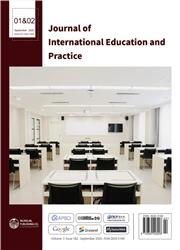Benefits of Internationalization to Students Cosmopolitan Competency
引用次数: 0
Abstract
Higher education institutions across the world are responding to globalization through internationalization. However, there is limited research that focuses on the benefits of both internationalization-at-home and cross-border internationalization to students’ cosmopolitan competency from the perspective of students. Therefore, this qualitative case study explored the benefits of internationalization to students from the perspectives of both domestic and international undergraduate and graduate students at two U.S universities. Purposeful and snowball sampling strategies were adopted to identify sixteen students. Data were garnered via interviews, institutions’ websites, and documents. Constant comparative method was employed to analyze the data. Findings from this study revealed that students acquired bilingual or multilingual abilities, firsthand cultural knowledge, global knowledge, cultural nuances critical to showing respect to people from different cultures and geographical backgrounds, friendship and networking, personal growth, high tendency to develop empathy through university internationalization, and opportunity to taste food from different parts of the world. The study recommends that, institutions of higher education should provide opportunities such as foreign language courses, Rosetta Stones, language laboratories, foreign language conversation hour sessions, English as a Second Language (ESL) or Intensive English Language program for students. Also, administrators and faculty are encouraged to provide a platform for study abroad returnees to share their experiences with their colleagues. Higher education institutions should continue to recruit more international students to enrich students’ experiences and global learning.国际化对学生国际竞争力的好处
世界各地的高等教育机构都在通过国际化来应对全球化。然而,从学生的角度出发,关注国内国际化和跨境国际化对学生国际化能力的好处的研究有限。因此,本定性案例研究从两所美国大学的国内和国际本科生和研究生的角度探讨了国际化对学生的好处。采用目的性和滚雪球抽样的策略,确定了16名学生。数据是通过采访、机构网站和文件收集的。采用恒常比较法对数据进行分析。研究结果显示,学生获得了双语或多语言能力、第一手文化知识、全球知识、对尊重来自不同文化和地理背景的人至关重要的文化差异、友谊和网络、个人成长、通过大学国际化培养同理心的高度倾向,以及品尝来自世界各地食物的机会。该研究建议,高等教育机构应该为学生提供外语课程、罗塞塔石碑、语言实验室、外语会话小时课程、英语作为第二语言(ESL)或强化英语课程等机会。此外,学校还鼓励管理人员和教师为海归提供一个与同事分享经验的平台。高等教育机构应继续招收更多的国际学生,以丰富学生的经历和全球学习。
本文章由计算机程序翻译,如有差异,请以英文原文为准。
求助全文
约1分钟内获得全文
求助全文

 求助内容:
求助内容: 应助结果提醒方式:
应助结果提醒方式:


